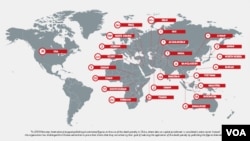More people were put to death in countries around the world last year than in any other year during the past quarter-century, Amnesty International said Tuesday.
The report said at least 1,634 people were executed in 2015, a rise of 54 percent from the year before and the highest number the human rights watchdog has recorded since 1989.
Executions were carried out in 25 countries, but just three – Iran, Saudi Arabia and Pakistan -- accounted for 90 percent of all recorded executions.
Pakistan ends moratorium
In Pakistan, the December 2014 Taliban attack on a school in Peshawar that killed 141 people led the government to end its moratorium on executions.
"Initially the moratorium was meant to be lifted only for terrorism-related crimes," said Chiara Sangiorgio, death penalty researcher at Amnesty International. "But very soon, we saw persons being sent to the gallows for murder or other ordinary crimes, often on the basis of trials that leave a lot of doubts about the safety of the conviction.”
Amnesty said at least 158 people were executed in Saudi Arabia, a predominantly Sunni country. Among those executed was Shi'ite cleric Sheikh Nimr al-Nimr.
Riyadh said it uses the death penalty against terrorists, but Amnesty claims it is often used against political dissidents.
Drug offenses
In Iran, many executions were carried out for drug-related offenses.
“A significant proportion of the 977 executions that we recorded for Iran were carried out for drug-related offenses – even if international law clearly states that the use of the death penalty should be restricted to intentional killing," Sangiorgio said.
Iran is one of the last countries to execute child offenders, in violation of international law. Last year, it executed at least four people who were under 18 at the time of their crimes, the report said.
However, the true number of people executed globally is likely much higher, because China is excluded from Amnesty’s data, she added.
“This figure does not include the thousands of people that we believe were executed in China last year, where the use of the death penalty and the figures in particular in relation to the use of the death penalty remain classified as a state secret," she said.
Belarus, the only European country to use the death penalty, and Vietnam also do not provide data.
US executions
The U.S., the only country in the Americas to use capital punishment, was fifth on the Amnesty list of the most executions carried out in 2015.
There were 28 executions in six U.S. states – the southern state of Texas accounted for almost half the total.
America "recorded the lowest number of executions since 1991. And also the lowest number of sentences imposed since the death penalty was reintroduced in the United States in 1977," Sangiorgio said.
Amnesty Secretary General Salil Shetty said, "Thankfully, countries that execute belong to a small and increasingly isolated minority."
For the first time, a majority of the world’s countries -- 102 -- have now fully abolished the death penalty. Four countries adopted the ban in 2015: Fiji, Madagascar, the Republic of Congo and Suriname.








